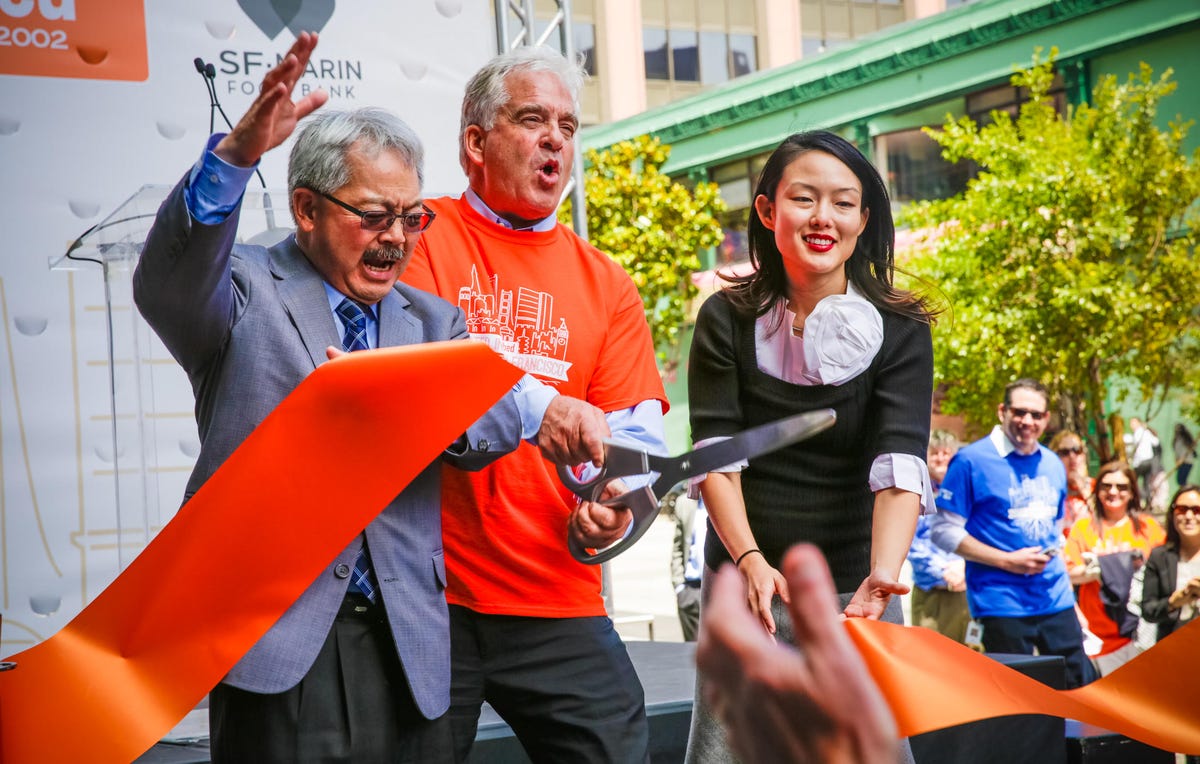Vexed in the city: The tech invasion of San Francisco (pictures)
As business booms the city is chockablock with activity. But even as San Francisco enjoys a new golden age, it's struggling with a widening divide between haves and have-nots.

Ribbon Cutting San Francisco
Mayor Ed Lee (left) exults, flanked by Riverbed Technology CEO Jerry Kennelly at the ribbon-cutting ceremony celebrating the opening of a new corporate headquarters in downtown San Francisco. In the last couple of years, many technology companies large and small have chosen to put their headquarters -- or open branch offices -- in San Francisco.
The Salesforce Tower
The tech industry is raising its physical profile in San Francisco. For instance, Salesforce.com, already San Francisco's biggest tech employer with 14,200 workers, will lease more than half of a 61-floor high skyscraper bearing the company's name. City officials expect the 1.4 million square foot tower to fill up by the time it's in move-in condition upon completion in 2017.
Mission Street: A neighborhood in transition
For years, Mission Street was a working class community with a large Latino population. Attracted by the neighborhood's great weather and original architecture, newcomers working for tech companies are moving into Mission. Their arrival has not gone unnoticed as it has coincided with rising rents and increasing evictions.
LinkedIn expands into SF
Across the street from CNET's downtown San Francisco offices, LinkedIn will be moving into a 26 story skyscraper -- yet one more vivid instance how the tech industry is physically transforming the city's skyline.
Fremont Mayor Bill Harrison
Fremont Mayor Bill Harrison wants to compete with San Francisco and other Bay Area locales for tech jobs.
Here, Harrison stands in the under construction Warm Springs BART subway station, which is set to open in 2015 adjacent to Tesla's auto assembly facility.
New BART station going up
One of the centerpieces of Fremont, CA.'s plans to lure tech firms is a the new Warm Springs BART station that's now under construction.
Tom Perkins
Venture capitalist Tom Perkins ignited controversy earlier in the year when he compared criticism of the wealthy to the Nazi persecution of the Jews.
Doing the dirty work
The perks at Silicon Valley tech companies have become a major pull for potential employees, and these bonuses are part of an ever-expanding suite of compensation.
Here, dry cleaning just back from the laundry hangs at Facebook, waiting for pickup.
Strange rooms, Strangelove
This stunningly designed conference room at Airbnb mimicks the style of the film
"Dr. Strangelove."
Big Giver: Marc Benioff
Salesforce's 6 foot, 5 inch CEO Marc Benioff has personally donated more than $200 million to Bay Area hospitals. Meanwhile, a philanthropic program his company started since 1999 has donated more than $68 million with Salesforce employees volunteering some 680,000 hours of their time.
Mark Zuckerberg, mover and fixer
Facebook CEO Mark Zuckerberg is one of the tech CEOs calling on Congress to fix what has been described as a broken immigration system. Meanwhile, the controversy over H-1B visas for foreigners shows little sign of fading -- especially when many US-born engineers can't find jobs.
Fwd.us make a push
Reid Hoffman, LinkedIn co-founder and nowadays a partner at venture capital firm Greylock Partners pauses as he speaks to undocumented hack-a-thon participants at a FWD.us event at LinkedIn in Mountain View, Calif.
FWD.us is pushing to engage the tech community to advocate for immigration policies.
The Rainmaker: Ron Conway
Ron Conway, one of the most connected people in tech and political circles: "The tech community understands that it is relatively new to San Francisco and is committed to working with community leaders to work through these issues."
Pop-ups on Market Street
Along a once-grimy stretch of Market Street, startups are moving in and formerly vacant offices are buzzing with new activity, such as at this Amazon Pop-Up Loft.
Spiffing up a rundown section of SF
Startups and other tech-centric business are moving into long neglected areas near Francisco's central artery, Market Street.
City of haves and have-nots
For better or for worse, for richer or poorer, San Francisco is changing, again. In ways that seem to highlight the divide between rich and poor, between the haves and the have nots, the tech and the tech-nots, and the build and the build-nots, this is the new, NEW San Francisco.
Airbnb, whose offices are pictured here, says 82 percent of hosts rent only places where they live. But given San Francisco's low vacancy rate of 2.9 percent, housing advocates worry that the popularity of the startup service is contributing to a reduction in the rental stock in an already tight housing market.

